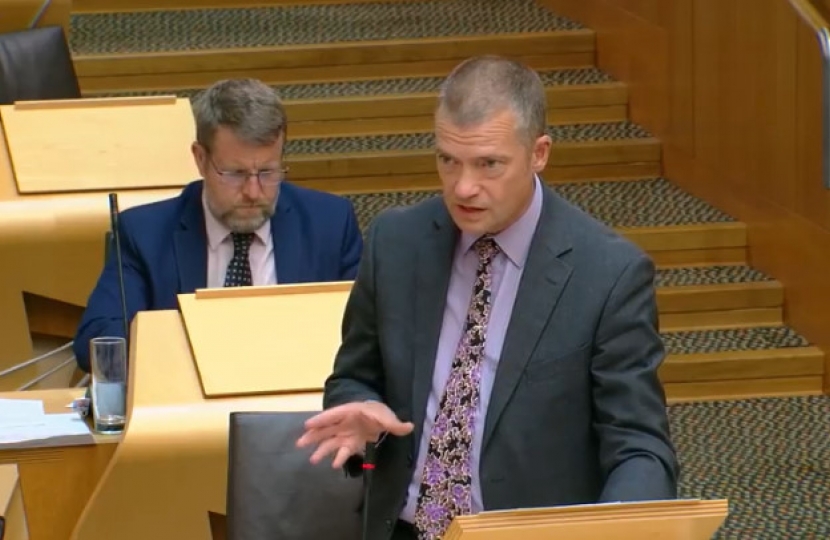
TODAY, sees parliament debate education governance in Scotland. It follows one of the Scottish Government’s many consultations and John Swinney’s subsequent ‘Next Steps’ paper.
The first conclusion to draw from his response is that he has finally – in part at least – come to the conclusion that the Scottish Conservatives have been right all along in saying that schools need to be freed up and given more autonomy. The devil, as always with the SNP, is in the detail and that’s where Mr Swinney’s proposals unravel.
The debate is set against a background that makes for grim reading. Standards in Scottish schools are falling. The International PISA results show that Scottish education has gone backwards. Since 2006, reading has dropped from a score of 499 to 493. The mathematics score has from 506 to 491, whilst the science score has taken the worst fall from 515 to 497.
Numeracy attainment is down. When it comes to numeracy, where pupils are performing well or very well, between 2011 and 2015, is down for P4, P7 and S2 (10, 8 and 2 per cent respectively). One in six secondary school pupils’ writing skills are not at the recommended level. Shockingly, the percentage of children in S2 who are not at the required level has more than doubled in 4 years from 7 per cent in 2012 to 16 per cent in 2016.
The Curriculum for Excellence has been far from that so far, which is why the Scottish Conservatives have called for a review. As a parent, I was mightily relieved when East Renfrewshire – where my daughters went to school – decided to delay its implementation and the new exams which came with it. It meant my youngest daughter just escaped and is now happily studying at university.
So what of Mr Swinney’s next steps?
I sat on the Commission on School Reform, set up in November 2011 by the think tanks Reform Scotland and the Centre for Scottish Public Policy. Its aim was to consider whether the school system in Scotland was meeting the present and future needs of young people and to try and reach a consensus about specific recommendations on areas for improvement or that require further inquiry. The Commission was chaired by Keir Bloomer and published its final report, ‘By Diverse Means: Improving Scottish Education’, on 4 March 2013.The Commission had members from Labour – including former education minister Peter Peacock, the SNP, Lib Dems and ourselves, as well as experts from outside politics.
We didn’t agree on everything, of course but we were all agreed in our final conclusions – that Scotland’s education system lacks the diversity that is a vital element of any learning organisation. The Commission called for variety in the system as a crucially important prerequisite of future improvement. We said that the best way of achieving this objective is to increase the autonomy of individual schools. And we concluded that every school should have as much control over its resources as is practicable. They should be encouraged to innovate and take well-considered risks.
So you might think that I’d be leaping about with excitement at John Swinney’s proposals to give head teachers and schools more autonomy. Indeed I would, if that is what he was proposing.
The problem is it isn’t. It’s quite the reverse in fact.
Mr Swinney wanted to strip councils of powers, leaving them with a few minor admin functions and pass any education responsibilities to up to seven giant regional bodies. He is calling these Regional Improvement Collaboratives and councils will be forced to cooperate with them and partly fund them.
Schools will be answerable to the partnerships – headed by new super-directors appointed by, guess who? You got it in one folks, John Swinney. Keir Bloomer, who chaired the Commission on School Reform, called the new bodies "compulsory, authoritarian, unwanted, bureaucratic and hierarchical". Stirling University's Professor Walter Humes said the new regions are an "overarching bureaucratic structure". One thing is certain, they won’t give schools greater autonomy.
Mr Swinney has ruled out true autonomy by rejecting plans by the parents of St Joseph’s School in Milngavie to opt out of local authority control. And he won’t allow schools to buy services from the provider of their choice as that has to be either the council of the new collaborative.
Nor will heads by able to decide on staffing numbers, surely a big decision that could help close the attainment gap? If Mr Swinney gets his way we will end up with a more centralised system, with an extra layer of bureaucracy. The new collaboratives will be answerable to him, not locally elected councillors.
Mark my words, if the SNP get away with this ‘reform’ there will be others on the way. Councils will end up stripped of powers in areas such as roads too. It’s a slippery slope and one we must fight.
